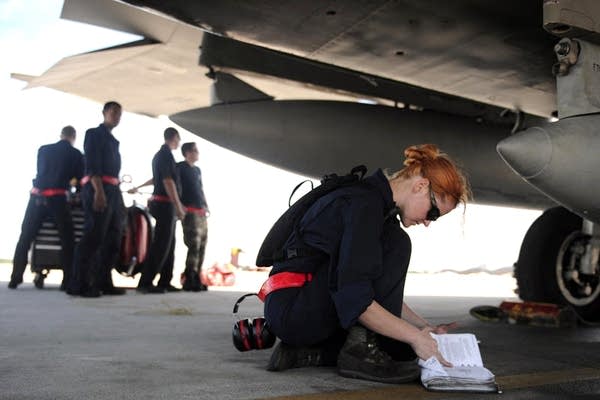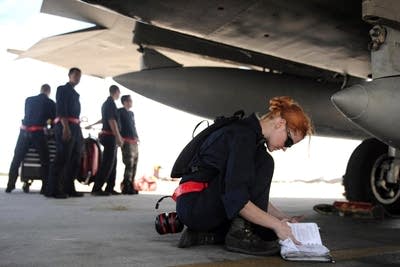Military code can get in the way of rape prosecutions
Go Deeper.
Create an account or log in to save stories.
Like this?
Thanks for liking this story! We have added it to a list of your favorite stories.

The Senate Armed Services Committee took steps Tuesday to find solutions to the enormous problem of sexual assaults in the military — something Secretary of Defense Chuck Hagel has called a "scourge."
A Pentagon report last month estimated that as many as 26,000 people in the military were sexually assaulted in 2012 — up from 19,000 the year before. For a multitude of reasons, though, only about 3,400 victims reported their attacks.
Critics in Congress and elsewhere have pointed to the Uniform Code of Military Justice as one of the problems. Under the code, commanding officers can shield suspects from prosecution, and even vacate a guilty verdict. Legislation being offered in Congress would mandate a change in the code to ensure that military prosecutors, not commanding officers, make the decisions on whether to charge suspects.
As reported by Luisita Lopez Torregrosa in The New York Times:
Turn Up Your Support
MPR News helps you turn down the noise and build shared understanding. Turn up your support for this public resource and keep trusted journalism accessible to all.
It's generally agreed that a proposal put forth by Senator Kirsten E. Gillibrand of New York seems the most promising. Her bill would give military prosecutors — not commanders — the power to decide which cases to try. The senator has said that taking that power from commanders might encourage men and women in the services to report sexual crimes without fear of retaliation. ...
Nearly shouting at one point, she told the secretary of the Air Force, Michael B. Donley, that the pattern of sexual assault was "undermining the credibility of the greatest military force in the world."
When Gen. Mark A. Welsh III, the chief of staff of the Air Force, said that the problem was difficult to solve because young women in the military had been raised in a society with a "hook-up mentality,'' Ms. Gillibrand lashed back, saying, "To dismiss violent rapes as part of the hook-up culture shows a complete lack of understanding. We're not talking about a date gone badly. We're talking about criminal behavior by predators who often stalk their victims in advance."
Would changing the way sexual assaults are handled in the Uniform Code of Military Justice be a step in the right direction?
LEARN MORE ABOUT SEXUAL ASSAULT IN THE MILITARY:
• Don't Trust the Pentagon to End Rape
"Though the Defense Department estimates that there were 26,000 sexual assaults in the military last year, fewer than 1 percent resulted in a court-martial conviction. Why? There is a deep institutional bias in the military's justice system; senior officers can — and often do — intervene to prevent cases from being investigated and prosecuted." (Kirby Dick, in The New York Times)
• JAG Corps and Reforming the Military Justice System
"In stark contrast, the military has no career prosecutor track. Each service recruits highly talented law graduates who have equal or superior qualifications to those hired by DA offices. But military lawyers act as prosecutors for only a fraction of their careers and thus never develop the depth of expertise or experience the volume of cases that their civilian counterparts experience. In reality, a large majority of military prosecutors must 'cut their teeth' on serious felony cases well before any would be ready to handle those cases. That is not fair to the attorneys — and especially not to the victims." (Charles "Cully" Stimson, The Heritage Foundation)
• Revisiting the Military's Tailhook Scandal
"In 1992, a young Navy lieutenant named Paula Coughlin said she had been sexually assaulted at the 35th Annual Tailhook Symposium in Las Vegas. Her complaints revealed an ugly side to the annual convention for 'Top Gun' aviators: 83 women and 7 men were later found to have been assaulted during the raucous party weekend in September 1991. The resulting scandal forced the resignation of the secretary of the Navy, the censure of several admirals and the enactment of a reform agenda that stressed a 'zero tolerance' policy. Did it make a difference? More than two decades later the news remains extremely discouraging." (Michael Winerip, in The New York Times)




